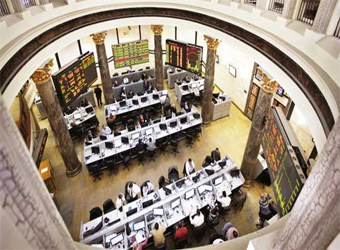Egypt market has encountered once again losses of EGP 766 million driven by the local and Arab selling pressures amid the wide-scale global outrage over the country’s verdict in the NGO case and the threats gaffe as regards to the Ethiopian dam.
Accordingly, the Egyptian Exchange’s indices have ended this week on red notes by Thursday afternoon.
Egypt’s benchmark index EGX30 inched down by 0.21% to close at 5061.02 p; while the EGX20, it fell by 0.13% to end at 5656.93 p.
Meanwhile, the mid- and small-cap index, the EGX70 pushed down by 1.03% to conclude at 408.15 p. The price index EGX100 also shed by 0.29% to finish at 700.15 p.
The capital market has closed at EGP 342.471 billion on Thursday.
Traded Volumes & Trades
Through the closing session of Thursday, the trading volume reached 73.899 million securities. For the traded value, it reached EGP 278.214 million, exchanged through 17.100 thousand transactions.
Also during the closing session of Thursday, 165 listed securities have been traded in; 103 declined, 39 advanced; while 23 keeping their previous levels.
Investors’ Activity
Egyptians and the Arabs’ selling pressures dragged EGX’s closing losses as they were net sellers seizing 62.81% and 5.75% respectively, of the total markets, with a net equity of EGP 36.728 million and 7.335 million excluding the deals.
Meanwhile, the non-Arab foreigners were net buyers seizing 31.44% of the total markets, with a net equity of EGP 44.064 million, excluding the deals.
Global Outrage Over NGO Court Rule In Egypt
Criticism against the sentencing of two German foundation workers in Egypt is crossing party lines in Germany. Experts also see a political signal in the Egyptian judge’s decision.
German Chancellor Angela Merkel acknowledged the judgment “with great dismay,” a spokesperson said in Berlin on Wednesday (05.06.2013). The decision is a puts a strain on German-Egyptian relations, the statement continued. Workers at several other international non-governmental organizations (NGOs) were similarly sentenced.
German Foreign Minister Guido Westerwelle also said he was upset and very concerned about the harsh punishments the court handed down to the German foundation’s employees. In a statement he said the court weakened the rule of law in Egypt and added that his ministry would work with the Konrad Adenauer Foundation to get the sentence lifted.
Peter Gauweiler, a member of Merkel’s Christian Democratic Union who serves on the parliamentary foreign affairs committee, demanded consequences. “We must stipulate reversal of this verdict, and until this has occurred, there can be no more diplomatic relations with this country,” Gauweiler told the Berlin-based DW.
An Egyptian court’s decision to give jail terms to 43 Americans, Europeans, Egyptians and other Arabs in a case against democracy-promotion groups runs counter to its transition to democracy, U.S. Secretary of State John Kerry said on Tuesday.
“The United States is deeply concerned by the guilty verdicts and sentences, including the suspended sentences, handed down by an Egyptian court today against 43 NGO representatives in what was a politically-motivated trial,” Kerry said a written statement. “This decision runs contrary to the universal principle of freedom of association and is incompatible with the transition to democracy.”
Meanwhile, Virginia Rep. Frank Wolf (R-VA) spoke on Tuesday on the floor of the House of Representatives condemning an Egyptian court for sentencing 43 NGO workers, including Americans, to jail. He also called for cutting off U.S. aid to the Muslim Brotherhood-led government in Cairo should the court decision stand.
The senator has urged U.S. President Barack Obama and Secretary of State John Kerry to personally raise this “travesty of justice” with Egyptian President Mohamed Morsi.
“This was a sham trial from the start. If this decision stands, not a penny more of U.S. taxpayer money should go to the Muslim-Brotherhood led government in Cairo.
“I call on President Obama and Secretary Kerry to personally raise this travesty of justice with Egyptian President Morsi.”
The White House said the court’s decision “undermines the protection of universal human rights,” and several senators suggested they would review Egypt’s standing.
Senator Patrick J. Leahy, Democrat of Vermont, called the convictions “appalling and offensive.”
“If Egypt continues on this repressive path, it will be increasingly difficult for the United States to support President Morsi’s government,” he said.
On-Air Ethiopia Dam Talk Scandal
The talks, chaired by president Morsi, revolved around a report of a tripartite Egypt-Sudan-Ethiopia commission on Ethiopia’s decision to divert the Blue Nile for a massive dam project, sparking fears of a major impact on downstream states Egypt and Sudan.
Seated around a large table, the politicians thinking this was a closed meeting began to suggest ideas for ways to stop the dam project.
Ayman Nour, head of the liberal Ghad Party, suggested spreading rumors that Egypt was buying military planes in order to put “pressure” on Ethiopia, he said.
He also suggested Cairo send political, intelligence and military teams to Addis Ababa because “we need to intervene in their domestic affairs.”
Yunis Makhyun, who heads the conservative Islamist Nur Party, said the dam constituted a “strategic danger for Egypt”, requiring Cairo to support Ethiopian rebels “which would put pressure on the Ethiopian government.”
The meeting, a huge embarrassment both for the presidency and the opposition members who attended, caused a storm of ridicule and anger in the media.
“A scandal in front of the world,” read the headline of the independent daily Al-Tahrir.
Popular talk show host Reem Magued, who aired parts of the meeting on her show, said: “It’s true that we asked for transparency from the government but not like this, not to the point of scandal.”
Ethiopia has begun diverting the Blue Nile 500 meters (yards) from its natural course to construct a $4.2 billion (3.2 billion euro) hydroelectric project known as Grand Renaissance Dam.
The first phase of construction is expected to be complete in three years, with a capacity of 700 megawatts. Once complete the dam will have a capacity of 6,000 megawatts.
